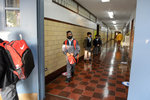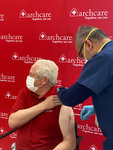

Catholic Schools Serve as a Standard Bearer
By CHRISTIE L. CHICOINE
The plight of the coronavirus pandemic “has brought out the very best in our people,” said Michael Deegan, superintendent of schools for the archdiocese.
“It has stretched all of us into being more, doing more, sacrificing more and working harder than ever before to ensure that our laity, our faithful people of the archdiocese—particularly our Catholic school families—are served in the way in which they deserve and the Gospel mandates and calls us to be.”
He said he is profoundly impressed with the work of the pastors, principals and teachers in ensuring that schools were able to open in September.
Deegan commended Cardinal Dolan; Bettina Alonso, executive director of development for the archdiocese; and Susan George, executive director of the Inner-City Scholarship Fund who oversees the archdiocese’s Catholic Education Advancement office. Because of their efforts, he said,“we have been able to raise millions and millions of dollars in financial aid and scholarships” and subsequently place in the hands of families that either otherwise would never have been able to come to a Catholic school or, because of the pandemic and the unemployment, would not have been able to remain in Catholic schools.
“We have kept our kids and our families in our schools through this generous work and we have recruited additional families into our schools...and that’s a great testimony to continuing to establish a sustainable and vital school system.”
Deegan acknowledged that the archdiocese “committed tens of millions of dollars to ensure that we could livestream classroom instruction from every classroom in every household of a student whose family has chosen to go remote. We never forced a family to send their children in and we’ve got a percentage of our families who felt it safer to keep the children home but to benefit from remote, home-based learning.”
Deegan shared that the most insightful question he has been asked by a member of the press about the pandemic has been, “In 10 or 15 years from now, what would you like the children who are currently in your schools to remember about this time?”
His reply, he said, was, “I hope that they remember that in the midst of this fear and anxiety and uncertainty, that they felt loved and nurtured and cared for during this difficult time, and that we brought the love of Jesus Christ to each of them in the same personal and intimate way we always have.
“As they look back retrospectively, I hope that they recognize and appreciate the enormous and valiant effort that the adults supporting Catholic education did to ensure and fight for our Catholic schools to exist, continue and to thrive.”
He hopes too that those same children may one day say that for those same reasons they are able to send their children to Catholic school.
Revised Plan Led to Success for Cardinal’s Annual Stewardship Appeal
By JOHN WOODS
The beginning of the Covid-19 crisis in New York last March hit just before parishes were to conduct their in-pew solicitation weekends for the Cardinal’s Annual Stewardship Appeal (CASA). And with churches in the archdiocese closed to the public for Masses until June, an entirely new game plan was needed for the 2020 Appeal campaign.
There was only one problem, said Bettina Alonso, executive director of development in the archdiocese. “Our whole organization and logistics is not built to be virtual. Everything is physical and in person.”
After an initial period of “complete shock,” her office pivoted quickly, Ms. Alonso said. CASA’s 2020 totals ultimately reached 99 percent of goal, or $19.87 million. The funds raised beat the initial projections of $17 million in light of the Covid-19 pandemic, she explained.
A $2.1 million bequest from a parishioner who had given small gifts for the past two decades boosted the annual figure significantly, Ms. Alonso said.
She explained that the turnaround achieved, even in the face of a serious challenge, “reflects the commitment of parishioners, and their generosity. We’re incredibly grateful to the pastors, who have been patient with us, and entertained our ideas. They have been partners in this.”
In-pew solicitations were pushed back until fall at many parishes. Improvements in communications, utilizing livestreaming and other digital forms, enabled many pastors in the archdiocese to reach not only the people who came in person for Mass but others watching online at home.
“We encouraged pastors to speak to both audiences from the pulpit,” said Juliette Picciano, director of CASA. “If you are here with us in person, thank you…There are materials at the back of church.
“If you are livestreaming and listening virtually, we’re also glad for your involvement. You can support the Cardinal’s Appeal by visiting cardinalsappeal.org/donate.”
Ms. Alonso credited the CASA campaign managers for the “savvy” work they did for parishes, and said many pastors did a good job leveraging communications platforms, such as Facebook and Flocknote, which in some cases they hadn’t previously used extensively or at all.
While emphasizing how far she and the CASA team have come since the beginning of the Covid crisis, she said “we’re still not where we need to be.”
She stressed improvements in adapting to “better, quicker ways of communicating,” such as email and texting, and emphasized that making fund-raising solicitations on Zoom can be a practical, time-efficient tool that serves everyone well.
Virtual Rosaries and planned Lenten reflections, led by Cardinal Dolan and featuring participation by parishioners and other potential donors, focus on familiar Catholic elements and offer opportunities to give.
Ms. Alonso also noted that some parts of a worshipping community “can’t be replaced virtually,” citing sacramental participation in the Eucharist and confession.
ArchCare Patients and Care Members Work Together With Same Goal
By DAN PIETRAFESA
ArchCare has received support for initiatives taken to protect care members and the people they serve during the Covid-19 pandemic, and ArchCare’s president and CEO Scott LaRue said what’s given him the greatest sense of gratitude is the can-do spirit of teamwork.
“The commitment and dedication that everyone involved with the ArchCare family, that includes our care members, our patients, our residents and their families have had to collectively work together to fight this pandemic,” LaRue said. “When we’re all walking lockstep with the same goal, we’re able to achieve remarkable things and that’s what’s getting us to the other side of this pandemic.”
ArchCare, the archdiocesan health care system, has about 4,000 care members and serves some 10,000 people each day. LaRue said ArchCare’s focal points in the coming weeks will be to continue to expand and improve its Program to Eliminate Contagion (PROTECT) and vaccinate ArchCare workers and the people ArchCare serves.
ArchCare invested over $2 million into PROTECT, which includes the use of ultraviolet filters in main vents to disinfect the air, before the start of Covid-19’s second wave last fall to protect care members and the people they serve from virus.
Dr. Walid Michelen, ArchCare’s chief medical officer and senior vice president for clinical planning and innovation, said the program has received support from care members, the people they serve and their families.
As for vaccines, 56 percent of ArchCare’s care members had been vaccinated as of Feb. 5, and Dr. Michelen and LaRue are hopeful more than 90 percent of ArchCare’s nursing home residents will have received their second dose of the vaccine by the end of the month. About 10 percent of nursing home residents chose not to be vaccinated.
“All of that is dependent on them providing us with the vaccines as we expect them to do,” LaRue said.
LaRue added, “I think the current vaccine distribution plan in general doesn't pay sufficient attention to those who are disabled and homebound and it’s nearly impossible for someone disabled or homebound to go online to make a vaccine appointment and get themselves out to a vaccination center. We’re trying to fill the gap and get vaccines into the arms of individuals who are disabled and homebound.”
Dr. Michelen said ArchCare was waiting for approval this week from the New York City Department of Health to use its three PACE centers in New York City to administer vaccinations to members of the ArchCare family, such as PACE participants. PACE is part of ArchCare Senior Life and allows individuals 55 and over who need nursing home care to receive their care at home.
In January, ArchCare announced it was installing MedSign’s Qortex Telehealth System into homes of all PACE participants, allowing them to connect with health care professionals through their home TVs. Dr. Michelen said the telehealth system has been a great resource for care members, PACE participants and their families.
More stories about how parishioners and agencies in the archdiocese have responded during the Covid-19 pandemic will be published in the next issue.